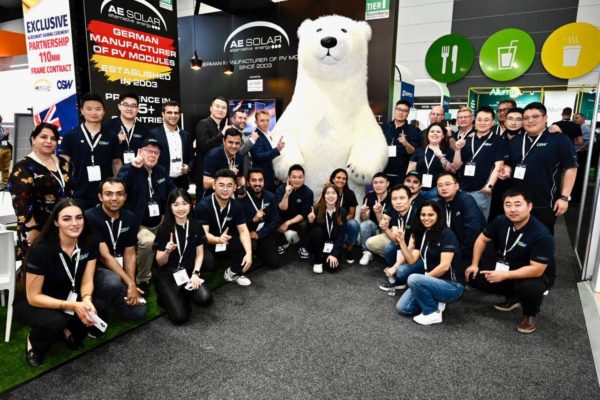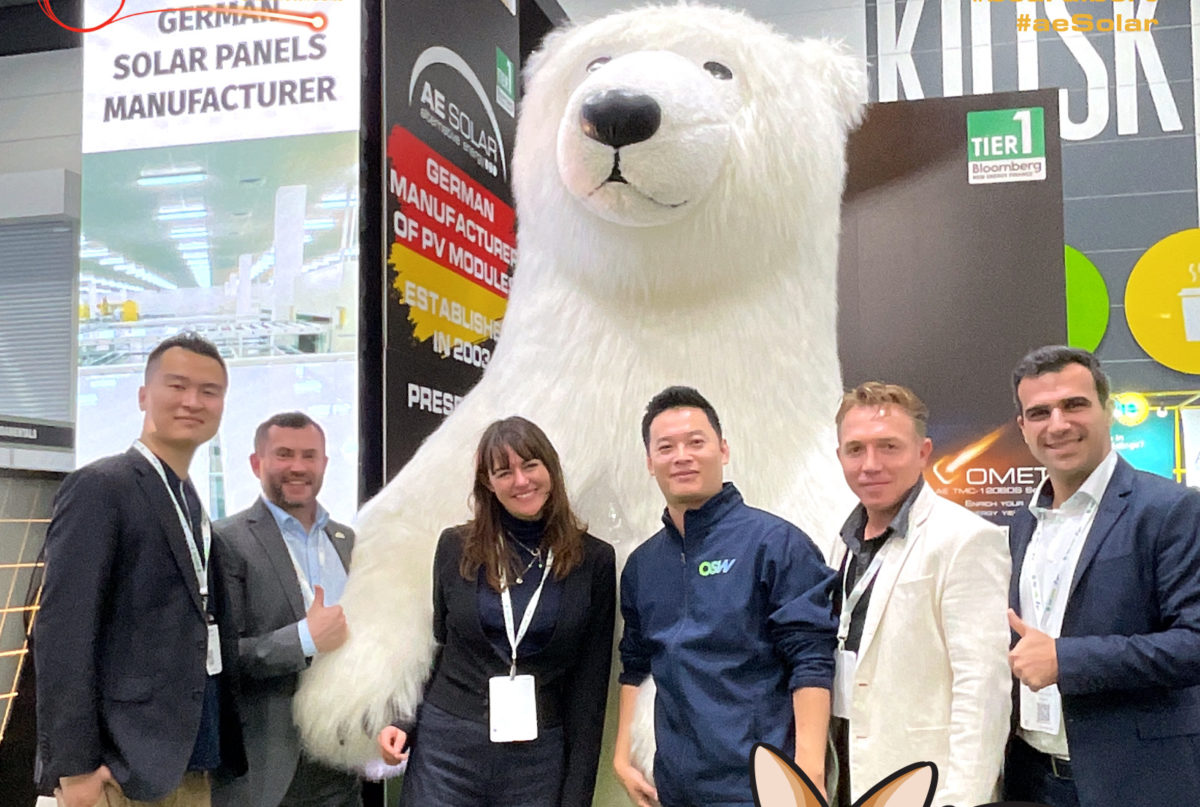Already well established in Europe and closing in on two decades of manufacturing, AE Solar has been trying to break into the Australian market for some time. Now, with an Australia-adapted panel and an exclusive distribution partnership with wholesaler One Stop Warehouse under its belt, the company seems poised to do just that.
Beside a giant dancing polar bear, pv magazine Australia sat down with the company’s head of research and development, Dr Hamed Hanifi, who has been leading the modification team and is something of an expert in engineering panels for harsh environments, having written his PhD on desert solar modules.
What the company has come up with for the Australian market is a bifacial, double glass, mono-crystalline PV module with half-cut cells. The panel’s power range sits between 395 Watts and 415 Watts, with up to 21.27% efficiency.
Essentially, the AE415MD-108BD panel is a redesign from AE Solar’s cornerstone Aurora Series, using different materials its engineers say will better endure in Australia’s severe climate.
“What UV [ultraviolet] is doing to panels is that it is degrading the polymer materials very, very fast,” Dr Hanifi said. “So if you have the modules outside with glass and normal backsheet, normal EVA [glue], you see that after sometime, they start to discolour, they start to crack the polymers, they start to chalk and also they start to delaminate… the module itself, if you put it in Germany, it’s perfect. If you put it here, then you see the degradation much faster.”
To tackle this deterioration problem, the company has opted for a double glass configuration, doing away with the traditional, degradation-prone backsheet and employing a design uses less polymer overall.
Rather than sticking to EVA or ethylene vinyl acetate glue, AE Solar’s Australia modified panel will use polyolefin elastomers, better known as POE, to adhere surfaces. This material, Dr Hanifi says, fairs better in humidity and doesn’t degrade with UV exposure.
The panel is also bifacial, a feature which can increase a panel’s yield by up to 25%, though Dr Hanifi says a more realistic projection for rooftop panels sits between 3% to 10% since it’s dependent on factors like framing and the particular roof’s colour.

Image: AE Solar
“This is basically not a matter of ‘we have a module, let’s put it in the Australian market.’ We thought about it, and then we put it in the Australian market. We really adapted it to the Australian environment and stress factors,” Dr Hanifi said.
Targeting the rooftop segment, the panel is also lightweight and small, weighing 22.5kg and measuring 1722 x 1133 x 30mm. The panel includes a 30-year product warranty and performance guarantee.
“Of course, we also thought about the optics,” Dr Hanifi added, noting the panel’s sleek black aesthetic – a feature increasingly preferred in the Australian rooftop market.
Cost
In terms of pricing, Dr Hanifi says AE Solar is far closer to Chinese manufacturers like Trina and Longi than, say, the “premium” brands like Maxeon Sunpower or QCells.
This is likely because AE Solar manufactures in China, as well as Turkey, though the company’s research and development team remain based in Germany.
The company seems to be looking to leverage Germany’s reputation for high quality and pairing it with low costs to break into the market here – a play it has had on the cards for at least a few years, with pv magazine reporting back in 2020 that the company would launch its lauded anti-shade technology here.
AE Solar’s patented anti-shade panel
The company had a fancy demonstration of this technology in action at All Energy, setting up its patented anti-shade panel with lights and a water pump next to a conventional panel using real time shading to show the difference – which was indeed notable.
To be clear, AE Solar’s patented anti-shade panels, which include a “micro” bypass diode between individual cells to make them resistant to shading and hot spots, are not among the first shipment the brand will offload with One Stop Warehouse (OSW).
Anson Zhang, founder of OSW assured the technology would be among their offering of AE Solar products in the near future.
One Stop will be the exclusive distributor’s of AE Solar’s technology in Australia, part of a partnership also announced at All Energy. This partnership, Dr Hanifi says, will afford AE Solar access to the Australian market, without having to work the sales side themselves – which may be behind the brand’s spluttered start in Australia.
According to OSW product manager Charles Wang, the aim is to have 15 MW of AE Solar’s products available in Australia in the first year.
One Stop Warehouse international expansion
After having solidly established its marketshare in the world of Australian solar distribution in the last decade, OSW is in a period of evolution. The company, CEO Anson Zhang tells pv magazine Australia, is looking to expand its C&I offerings. Recently, it’s seen a big jump in demand from that sector, which now provides around 25% of the company’s revenue, with the remaining 75% coming from residential, Zhang said.
It is also quite literally expanding, currently in the process of opening offices in the US and Europe. OSW is set to open a warehouse in Dallas, Texas, in January, and is planning a second location in Tampa, Florida, later in 2023.
In Europe, Zhang said the OSW team already has around 20 people, with bases in the Netherlands, Poland, and plans to enter Germany and France. More announcements on the company’s overseas expansion are expected in the coming months.
This content is protected by copyright and may not be reused. If you want to cooperate with us and would like to reuse some of our content, please contact: editors@pv-magazine.com.









1 comment
By submitting this form you agree to pv magazine using your data for the purposes of publishing your comment.
Your personal data will only be disclosed or otherwise transmitted to third parties for the purposes of spam filtering or if this is necessary for technical maintenance of the website. Any other transfer to third parties will not take place unless this is justified on the basis of applicable data protection regulations or if pv magazine is legally obliged to do so.
You may revoke this consent at any time with effect for the future, in which case your personal data will be deleted immediately. Otherwise, your data will be deleted if pv magazine has processed your request or the purpose of data storage is fulfilled.
Further information on data privacy can be found in our Data Protection Policy.